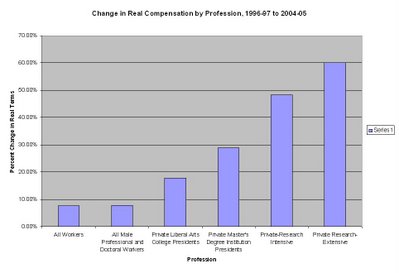
By Richard Vedder and Matt Denhart
This may be the most startling of the over 100 blogs done for CCAP in its short existence. The graph above (which can be enlarged if you click on it) provides very strong evidence that the following has occurred in the past decade:
1. In general, the salaries of private college presidents, adjusted for inflation, have risen several times faster than for all workers, or even for those workers possessing doctoral or professional degrees. College leaders are seizing some of the vast increase in funds coming to them and appropriating them for themselves (often implemented by highly compliant Boards of Trustees) -- in amounts far outdistancing what inflation or overall economic growth would warrant.
2. The salary ripoffs are far greater in research oriented institutions than in teaching oriented ones. The more research grants the institution receives, it appears that the greater the salary increases granted. For all their complaining about inadequate research overhead, the data suggest that universities very likely are using those monies to enrich quite literally the top admininistrators
3. The higher education emphasis on research appears to reflect more than merely a preference for exploring new frontiers as opposed to rehashing existing knowledge, but instead reflects a means of redistributing income from the general public to a chosen few who lead our colleges and universities.
The evidence was gathered through a careful analysis of compensation information on the salaries of private university presidents as reported by the Chronicle of Higher Education, for two years, 1996-7 and 2004-5. Figures for "Total Compensation" were used, and in a few instances where presidential salaries were listed as zero (Roman Catholic schools where the president was a priest), those observations were excluded. Comparisons are made with full-time, year-round worker earnings as reported by the U.S. Bureau of the Census, Current Population Survey. Because of an obvious data error relating to female workers, for the professional/doctoral worker computation below, only males were included (the exclusion of females should not materially change results).
The summary of the increases, adjusting for inflation by the Consumer Price Index for All Urban Consumers (CPI-U), are contained in the enclosed table (which along with the graph are near firsts for this blog site). While salaries rose by single digit amounts for all workers or all workers with professional and doctoral degrees, it rose far more for university presidents. For example, the real compensation increase for private research intensive university presidents of over 60 percent was eight times as great for all workers in society. It appears that perhaps Joe Six Pack is paying taxes to Washington, which is giving some of those funds to already relatively prosperous presidents at tax exempt universities.
TABLE
REAL COMPENSATION INCREASES, 1996-7 TO 2004-5
TYPE OF WORKER PERCENT INCREASE IN REAL COMPENSATION
All full-time workers 7.50%
Workers with Prof., Doctoral Degrees* 7.68
Private Liberal Arts College Presidents 17.76
Private Master Degree University Presidents 28.83
Private Research Intensive University Pres. 48.25
Private Research Extensive University Presidents 60.11
*Males Only
Source: Chronicle of Higher Education, U.S. Census Bureau, U.S. Bureau of Labor Statistics, Authors' calculations
Policy implications? We should review our tax exempt policies for colleges, we should rethink the funding of federal research grants, we should force colleges to engage in far more transparency on this issue, we should try to see if the trend with respect to presidents and football coaches holds for other high level positions --e.g., deans, university provosts, vice presidents, etc. In a system where there is little accountability to anyone, where there are few incentives to minimize costs, etc., it is not surprising that this trend has arisen. What are we going to do about it?

4 comments:
What exactly are "professional and doctoral workers?" Would that include physicians? Electrical engineers with Bachelor's degrees, or just those with Masters and above?
Superhiker - The title of this blog is "Center for COLLEGE Affordability and Productivity".
Big businesses do not fit the generally accepted definition of colleges.
Executives are accountable to shareholders in publicly traded companies - if they don't like the compensation packages, they can sell their stock or change the compensation packages through a vote. Owners of privately held companies are entitled to run their shop any way they want - ethically and within the limits of the law. I believe that's why they are private. If one does not like the executive pay of a privately held comany, one should not purchase their products. Ah, I just love a free market economy and the inherent inequalities which are the basis of economics.
Bob - when you say "...compensation for those of us who work in state institutions."; are you talking about making license plates?
Hiker,
The creation of my private corporation was a product of my entrprenuership and an overpaid lawyer - not the state.
I am not accountable to the state other than to pay my taxes. I am also accountable to the IRS to pay my federal taxes. My income can be anything I want it to be by drawing from net profit. The State of Montana can not dictate how I run my business or what my salary is unless I break the law. So the parallel does not hold.
Also, "looting a private company" is illogical.
Post a Comment